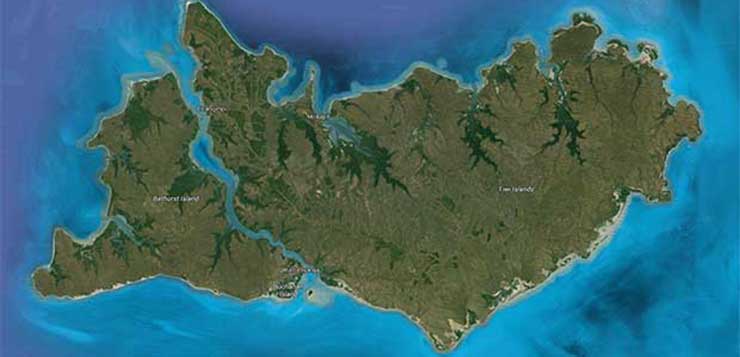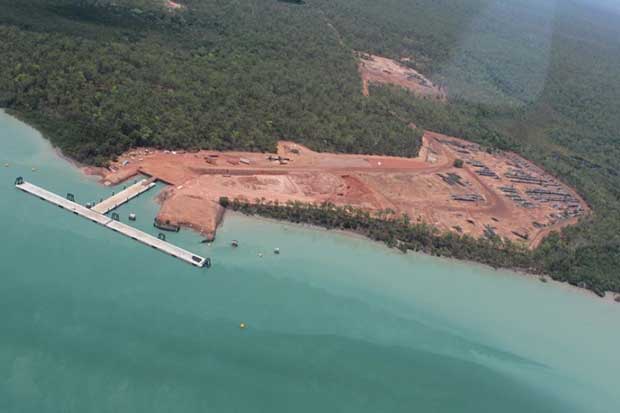The Federal Department of Environment has dropped its investigation into the Tiwi Land Council and its Singaporean development partners, which constructed a massive $130 million port to supply the Top End’s offshore oil and gas industry without any environmental approvals.
The port is located on the pristine waterways of the Tiwi Islands, around 80 kilometres north of Darwin, and has come under intense scrutiny since media revealed in May that construction of the facility was nearing completion, having flown under the radar of any proper environmental assessment.
The attention of conservationists has now turned to the Department of Environment (DoE), which blamed overworked staff for its own failure to properly investigate the port, despite being aware of it during months of construction involving between 70 and 80 workers at a time.
An existing wharf designed to service a small forestry industry on the island had stood at the site since 2003 but was destroyed by a cyclone in 2007. Since work started to rebuild it last year, the project has undergone a massive expansion to include storage tanks for 30 million litres of diesel and a 150-person accommodation camp.
This expanded development will operate around the clock at times and is expected to see around 50 shipping movements of vessels up to 200 metres long each month.
Little is known about how this — and a plethora of associated infrastructure — will impact the 38 threatened species that inhabit the Apsley Strait, where Singaporean company Ezion has constructed its offshore oil and gas port.
The scale of development, coupled with the incredible conservation value of the Tiwi Islands prompted Environment Minister Greg Hunt to initiate an investigation into how the port had escaped his scrutiny.
Documents obtained by New Matilda reveal some of the results of that investigation, including that the Department of Environment (DoE) bungled an investigation it had already began at the end of last year, and that there were suspicions the Tiwi Land Council and its partners had provided ‘false and misleading’ information.
But in a statement late yesterday, the DoE told New Matilda that its investigation is now complete, and while the government still has concerns about what impact the port’s operations will have on the environment, no breach of national environmental law has been identified.
“During the investigation the department questioned some of the information obtained … however it was concluded that no false or misleading information had been provided,” a spokesperson for DoE said.
The Acting Director of the Northern Territory Environment Centre, Anna Boustead, said that in this context, much of the blame for the lack of environmental checks and balances must now rest with the department.
“We find it completely unsatisfactory that the government has rubber stamped the construction of this major port after the fact,” said Boustead.
“That is obviously very bad process.
“It puts the environment at risk, the community at risk, and we call on the government to strengthen and improve its environmental regulation and processes rather than continuing its current policy, which is to water them down and take resources away from environmental protection and instead invest in supporting development before it’s been judged whether they’re good for the environment and community or not”.
“The level of incompetence that this case has demonstrated, I think, is just terrible and obviously in this case the environment and community have been put at risk when they shouldn’t have been.”
The Principle Lawyer at the Northern Territory Environmental Defender’s Office, David Morris, said the government’s decision to wave the project through sent the wrong messages to the developers, which Parliamentary Secretary to the Minister for the Environment, Bob Baldwin, has conceded did the wrong thing.
“The response by the government — that a port is able to be built without an environmental approval and that you only need to seek that at a later stage — indicates a significant deficiency in environmental protection laws in Australia,” Morris said.
“It’s clearly not the intended way for environmental law to operate,” he said.
“By saying it doesn’t need [approval]for construction, you give the green light for a company to go and spend an inordinate amount of money before they can go ahead and operate.”
As New Matilda reported on Tuesday, the Chairman of the Tiwi Land Council wrote in “extreme distress” to the Environment Minister after Port Melville hit the headlines explaining that the drama over environmental assessment had caused the Commonwealth Bank of Australia to suspend a loan for port equipment and brought the island’s decades-long forestry project to the brink of collapse.
“It gives you an indication [companies]feel a real assurance they’re going to be able to get an approval at a later stage,” Morris said.
The government has said wood from the Tiwi’s forestry project will be allowed to sail from Port Melville without environmental assessment, but yesterday the DoE told New Matilda that it has been forced to ask for further information after a formal referral it demanded in May was judged inadequate to assess the project’s likely impact.
It’s not the first time the department has received inadequate information.
In an internal report to the minister, obtained under freedom of information laws, the Assistant Secretary of the Compliance and Enforcement Division of the DoE, Shane Gaddes, blamed a bungled investigation from late last year on overworked staff.
“In December, the case was transferred to the Investigations Section [within the DoE]due to the high workloads in the Compliance Section,” Gaddes reveals in the report.
“Throughout December 2014 there was email correspondence between the Investigations Section of the Department and Ezion with several environmental reports being provided.
“The information in these reports is limited and the Department considers that the assessment of potential impacts on matters of national environmental significance within these reports is inadequate.
“At this point the department should have issued another show cause letter to Ezion Holdings. However as the case had been transferred to another section due to workloads, this did not occur.”
Greens Spokesperson for the Environment, Larissa Waters, said it was hardly surprising that a lack of resources contributed to the failure to assess Port Melville, given that the Environment Department will lose 26 per cent of its staff between 2013 and 2018.
“Clearly the department’s compliance enforcement capability needs to be strengthened, but the government is sprinting in the opposite direction,” Waters said.
She said around 430 staff have already been cut, and with a further 340 still to come, a total loss of 670 staff is expected over the next three years. Successive rounds of ‘efficiency dividends’, which Waters said were effectively staff cuts, will only add to the challenges this throws up.
“Labor and Coalition governments have imposed round after round of indiscriminate efficiency dividends and cuts which have gradually chipped away at our capacity to protect our precious places and wildlife,” Waters said.
“It’s unacceptable for a project that impacts matters of national environmental significance to go ahead without any environmental assessment because the Abbott Government won’t fund the staff required.”
Boustead said the Tiwi Islands are home to dugong, dolphins, and internationally renowned turtle rookeries and shore bird colonies, and she hopes the failures laid bare by the Port Melville saga will prove a wake up call for the government as it seeks to wind back environmental regulation on a range of fronts.
“The government needs to acknowledge that environmental protection legislation is actually important for reducing the costs in the long-term, to ensure that mistakes aren’t made,” Boustead said.
“Ultimately it’s the taxpayer who foots the bill and traditional owners and the community that are there for the long-term.
“These companies are not, and the government needs to acknowledge that and take people concerned about developments seriously rather than dismissing them.”
Donate To New Matilda
New Matilda is a small, independent media outlet. We survive through reader contributions, and never losing a lawsuit. If you got something from this article, giving something back helps us to continue speaking truth to power. Every little bit counts.





